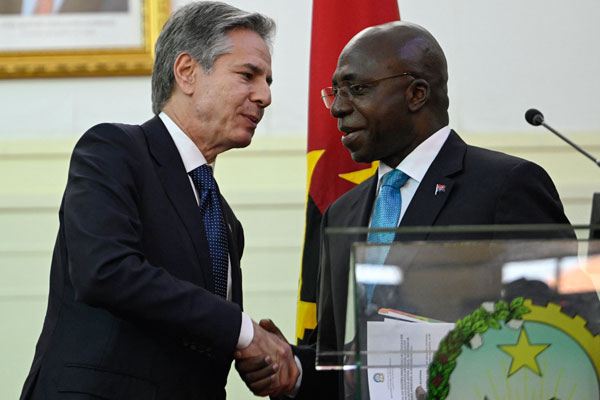Blinken hopes for DR Congo peace progress after election

US Secretary of State Antony Blinken (L) shakes hands at the end of a press conference with Angolan Foreign Minister Tete Antonio (R) at the Ministry of Foreign Affairs in Luanda on January 25, 2024. PHOTO / AFP
What you need to know:
- Over the past two weeks, Blinken has spoken by telephone to Tshisekedi and met Rwandan President Paul Kagame at the World Economic Forum in Davos, Switzerland.
US Secretary of State Antony Blinken on Thursday voiced hope for greater diplomacy to bring lasting peace to the Democratic Republic of Congo's troubled east following the vast country's elections.
Blinken discussed the conflict with Angolan President Joao Lourenco, whom the top US diplomat said was "trusted by all sides" and played an "essential" role in mediation.
"We talked about concrete ways to have that process move forward," Blinken told reporters after his meeting in Luanda.
Kinshasa has long accused Rwanda of backing M23 rebels, ethnic Tutsis who have seized vast stretches of territory in a conflict that has brough mass displacement and violence against women.
Blinken credited US-led efforts, including intelligence sharing, with ensuring calm in the long-turbulent DRC for December elections, which were won easily by incumbent President Felix Tshisekedi.
"Now that the election is done, we believe that it's an important moment to try to forge forward with diplomacy," Blinken said.
While stopping short of predicting the likelihood of success, Blinken called for expanding earlier Angolan and Kenyan efforts to "work towards a durable peace".
Over the past two weeks, Blinken has spoken by telephone to Tshisekedi and met Rwandan President Paul Kagame at the World Economic Forum in Davos, Switzerland.
The United States has previously found credible the allegations that Rwanda is providing support for the M23.
Kagame in turn has demanded action against Hutu fighters based in the DRC, who he says are connected to the perpetrators of Rwanda's 1994 genocide, which mainly targeted Tutsis.





